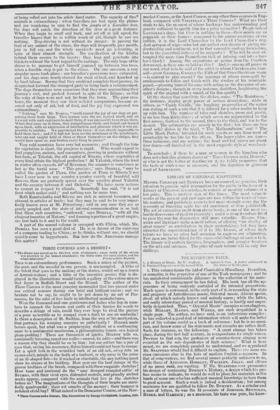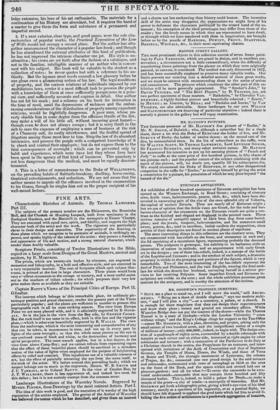THE nEvi EWER'S TABLE,.
I. A History of Music. By 'W. Stafford. 3. SplenO id Sins. A Letter addressed to 2. Practical Exposition of the Law of Will. the Puke of Wellington.
I. This volume forms the 52d of constables Miscellany. Its author, or compiler, is the proprietor of one of the York newspapers ; and he has manifested considerable diligence in the collection of his mate- rials. In their arrangement he has failed. His book has all the ap- pearance of being suddenly curtailed of its intended proportions. Much space is consumed, in the early part of it, in recording the state and progress of Antediluvian music, Oriental music, African music, about all which nobody knows and nobody cares ; while the latter, and really interesting period of musical history, is hastily and imper- fectly despatched. Thus, " Oriental Music" occupies seven chapters, while MOZART, HAYDN, and WEBER, are each despatched in a single page. The author, we have said, is an industrious compiler ; he has collected a good deal of information which will make the latter part of his volume useful as a book of reference: but he is no musi- cian, and hence some of his statements and remarks are rather droll. Such, for instance, as the following. "A great change has taken place, during the last half century, in compositions for single voices. Previous to that ara, the professors of' counter-tenor singing were regarded as the sole depositories of high science." What is here meant, we are completely puzzled to understand, and we apprehend Mr. STAFFORD svbuld find it difficult to explain. There :Ire some cu- rious omissions also in the lists of modern English composers. In that of song-Writers, we find several names perfectly unknown to us, while those of ATTwOOD, HORSLEY, WHINLEY, JOLLY, and ethers of no mean rank, are wanting. If Mr. STAFFORD ever prosecutes his design of continuing BURNEY'S History, a design which his pre- face seems to indicate, he would do well to place_his materials in the hands of some one who has sufficient musical knowledge to turn them to good account. Such a work is indeed a desideratum ; but among musicians few are qualified to follow Dr. BURNEY. As a scholar and a man of letters, he was the fit associate of JOHNSON, REYNOLDs, BURKE, and GARRICK ; as a musician, his taste was pure, his know- ledge exterisive, his love of his art enthusiastic. The materials for a continuation of his History are abundant, but it requires the hand of a master to give them the form and substance of a permanent and impartial record.
2. If a neat exterior, clear type, and good paper, were the sole cha- racteristics of popular works, the Practical Exposition of the Law of Wills would not occupy a second place. But the author has alto- gether misconceived the character of a popular law-book ; and though he has abandoned the external attributes of this kind of publication, he has not improved the intrinsic character one jot. His style is un- attractive; his views are set forth after the fashion of a catalogue, and not in the familiar, intelligible manner of an author who is conver- sant with his subject. His book will be valuable to the student as a collection of notes ; he never quotes but with a reference to his au- thority. But the layman must needs consult a law glossary before he can glean even a glimmering notion of his law. The legal conditions of. property, and the various relations of individuals imposed by our multifarious laws, render it a most difficult task to possess the people with a knowledge of them at once sufficiently perspicuous in a gene- ral view, and sufficiently accurate and copious in detail. Our author has not hit his mark ; and a reliance on his book for instruction in the time of need, amid the depressions of sickness and the embar- rassing considerations of the distribution of property among expectant relations, would be frightfully dangerous. Apoor man, whose po- verty shields him in some degree from the officious thralls of the law, may make a will of his little all, without incurring great hazard— though even he does not always escape ; but it is sorry thrift in the rich to save the expense of employing a man of business at the risk of a Chancery suit, its costly interference, and the fruitful spread of litigatiori among those most dear to him. Strip the law of its abundant intricacies, and possess the people with a competent knowledge pf it to check and control their,employe's ; but do not expose them to the fatal consequences of oversight ; which can be prevented only by habit and experience, which none have but they whose lives have been spent in the agency of that kind of business. This quackery is not less dangerous than the medical, and must be equally discoun- tenanced.
3. This is a letter of remonstrance to the Duke of WELLINGTON, on the prevailing habits of Sabbath-breaking, duelling, horse-racing, theatrical entertainments, and seduction. We are riot aware that the author means to impute all the offences involved in the enumeration to his Grace, though he singles him out as the proper recipient of his well-meant lecture.



















 Previous page
Previous page